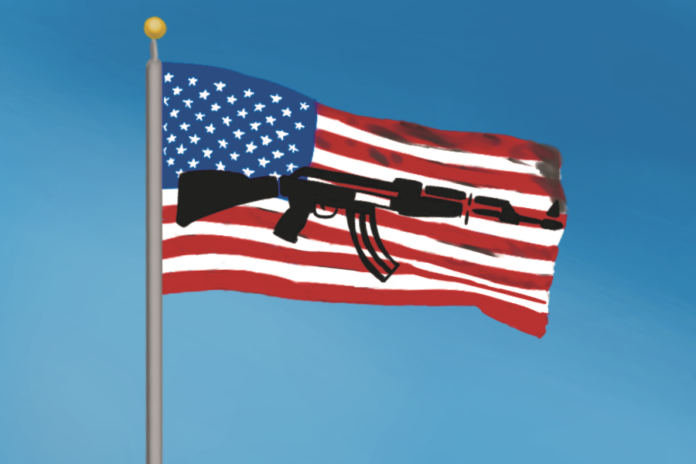Recent mass shootings show that more national comprehensive gun reform is needed
By CLAIRE SCHAD — cfschad@ucdavis.edu
In the first month of 2023, California and the rest of the U.S. was plagued with the awful reality that is gun violence. First, a mass shooting at a Lunar New Year’s festival left 10 dead and nine injured in the Southern California community of Monterey Park. Less than 48 hours later, seven people were killed by a violent firearm attack in Half Moon Bay, California. In January alone, the U.S. experienced 52 mass shootings and over 1,600 people were killed by guns.
Every time a mass shooting occurs and is picked up by the media, the longstanding debate about gun rights and gun control gains traction. Typically, one side immediately calls for stricter gun laws and regulations, while the other argues that proposed laws only infringe on the rights of gun-owning Americans and won’t decrease shootings.
This deep divide around guns in the U.S. has made it difficult for meaningful legislation to be passed. While certain states have made significant progress in passing and implementing gun control legislation, others have not.
This vast difference in access to guns in certain states has created loopholes for residents in states that have stricter laws. For example, while California has the strictest laws in the country, the bordering states of Nevada and Arizona act as safe havens for gun buyers. This phenomenon diminishes some of the effectiveness of California’s laws and illustrates that more comprehensive and national-level reform is needed.
Over the past year, California state legislators have worked to pass a variety of laws aimed at reducing gun violence in the state. Domestic violence offenders who have faced felony charges are barred from owning guns. There is a ban on high-capacity magazines and noise-muffling silencers. People with certain mental health diagnoses are restricted from buying guns. Finally, and probably most famously, semi-automatic guns, largely known as assault weapons, are banned completely.
So what happened? Why weren’t these laws enough to protect the lives lost in Monterey Park and Half Moon Bay?
This is still largely unclear. As details continue to emerge from the shootings, it seems that both Huu Can Tran, the shooter in Monterey Park, and Zhao Chunli, the shooter in Half Moon Bay, came very close to meeting requirements that should have restricted their firearm access. They had both had previous run-ins with law enforcement and both appeared to be in current mental health crises.
The weapon used in the Monterey Park shooting was a modified version of the MAC-10 pistol, manufactured in the 1960s and 1970s. It is now outlawed in California, as it is considered a semi-automatic weapon that has a threaded barrel and is designed to take 30-round magazines. However, the gun was purchased by the gunman in 1999, prior to the ban going into effect. Additionally, the weapon was not registered in the state of California and law enforcement officials are still unsure why.
Similarly, the semi-automatic handgun used in the Half Moon Bay shooting was legally obtained. Additionally, this firearm did not have any features that would deem it illegal under California’s assault weapon ban.
No matter which way you lean on the gun debate, it is clear that more needs to be done to combat these deadly shootings that seem to happen daily. More widely available mental health resources are needed in addition to gun control; these two ideas don’t have to signal two sides of a debate.
Ultimately, these tragedies tell us that state-level weapon bans are not enough. While this may not have been the case in the recent mass shootings, people who are outlawed from buying weapons in California can still travel to neighboring states such as Nevada and Arizona and purchase firearms. The implementation of national-level, comprehensive gun reform could provide more funding and resources to ensure that guns are kept out of the hands of dangerous people. We must enact national comprehensive gun control now. For each day we wait, more lives are lost.
Written by: Claire Schad — cfschad@ucdavis.edu
Disclaimer: The views and opinions expressed by individual columnists belong to the columnists alone and do not necessarily indicate the views and opinions held by The California Aggie.





